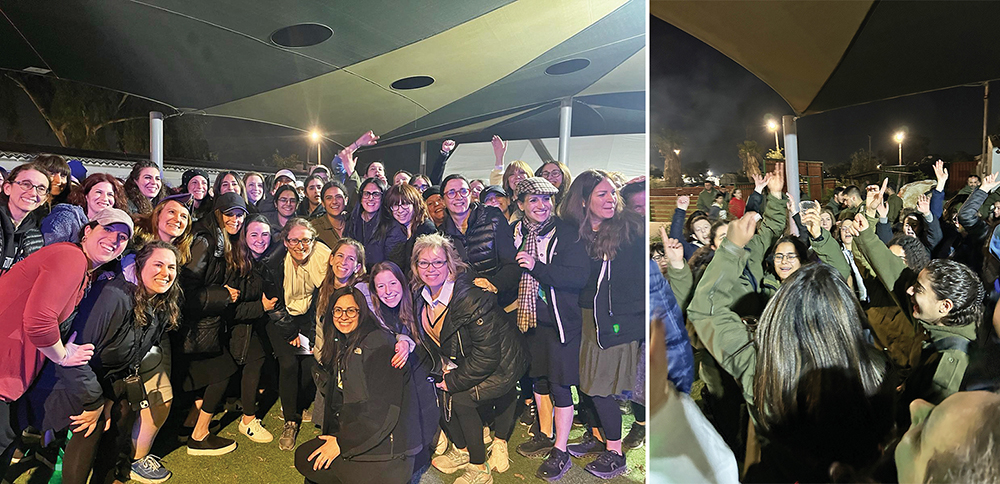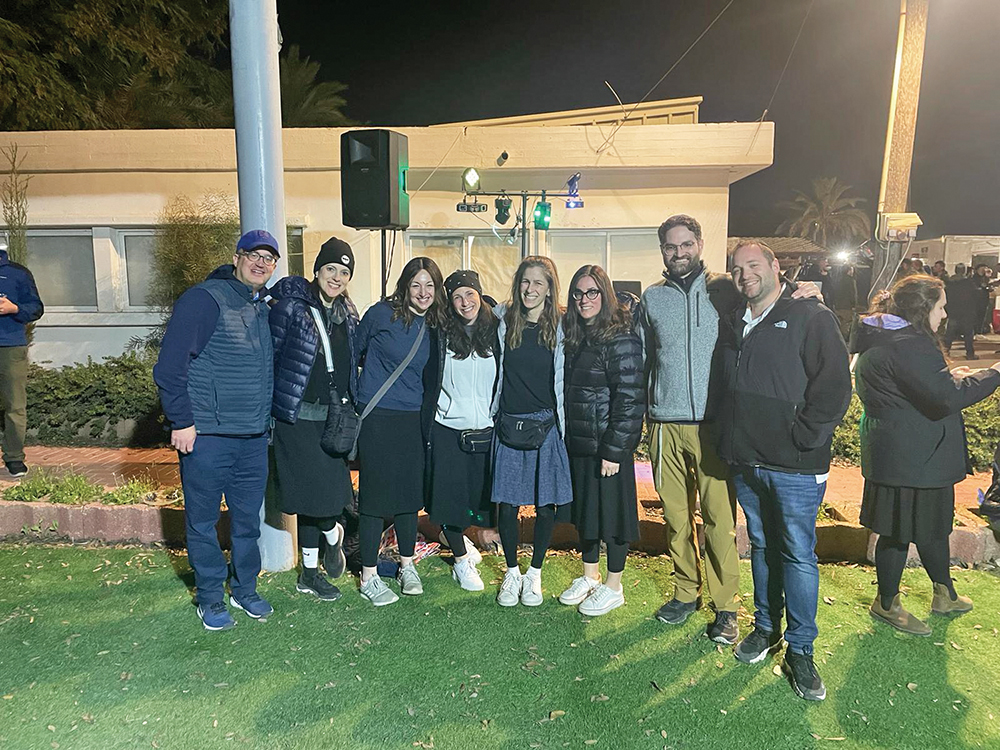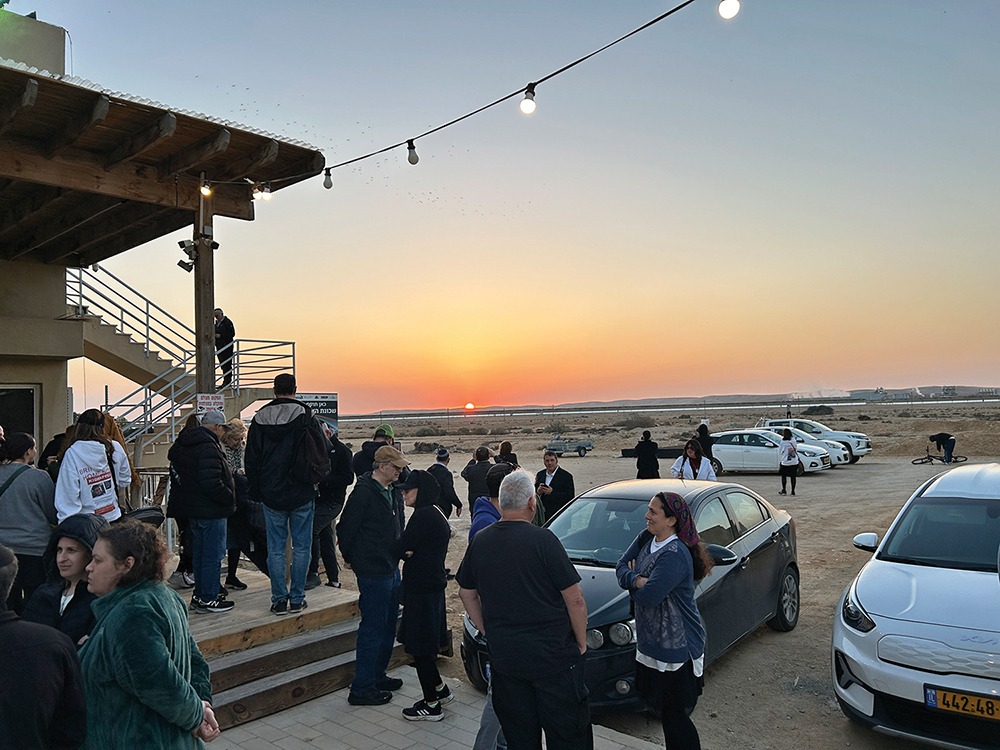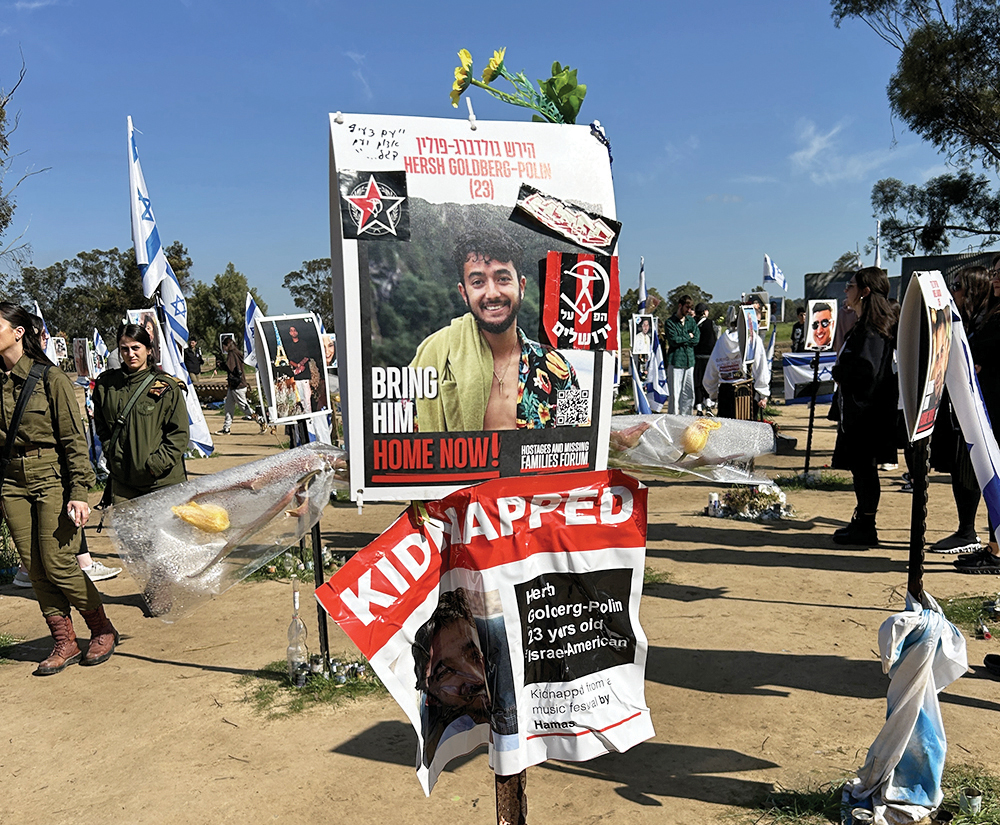
I would like to begin by thanking Rabbi Daniel Fridman of the Teaneck Jewish Center for spearheading the Bergen County Unity Mission to Israel. It was clear that he spent hundreds of hours coordinating the logistics and answering questions. Along with Rabbi Larry Rothwachs, Rabbi Chaim Strauchler, Rabbi Daniel Feldman, Rebbetzin Chani Krohn and our own Rebbetzin Michal Goldberg, he led a mission of three buses with 120 attendees from the Bergenfield and Teaneck communities and beyond. I feel lucky to live in a community that is able to collaborate so beautifully with one another and run a mission of this large scope.
When Rabbi Goldberg initially sent the email describing this mission, I felt an immediate pull to attend. I am not a particularly spontaneous person, yet I went on the El Al website right away and found a flight. I couldn’t commit to purchasing it, so I placed a 48-hour hold and used that time to overanalyze. Could I leave my family? Take off from work? Spend the money? What was motivating me to go? I started to question if a “regular” person like me is worthy of going on a mission to Israel. I spoke to a friend and expressed these doubts: “Am I chesed-y enough? Zionist enough?” My friend responded: “Are you Jewish? Then yes, you’re Zionist enough. Don’t second-guess yourself—just go.”
And so I booked.
Leading up to it, I still wasn’t sure what my expectations and mindset should be for this trip. A few days before I left, I asked my 16-year-old daughter for packing advice, as she had just returned from an Israel mission that her high school, Ma’ayanot, had organized.

“Bring tissues,” she said. “You’re going to cry a lot.”
My daughter was right. I cried. Our three-day mission was packed with many meaningful experiences, and I would like to share some of them with you.
Our first day of the mission was scheduled to include a stop to visit injured soldiers in a hospital and to volunteer at a farm. Yet the night before, we heard the devastating news that Maoz Morell, the son of Varda Devorah and Eitan, a soldier who was injured while fighting in Gaza, succumbed to his wounds and passed away. Maoz was the nephew of Bais Medrash of Bergenfield members and the cousin of a BMOB member, and so a decision was made that our bus, which contained BMOB shul members and Rebbetzin Goldberg, would switch from our regularly scheduled itinerary so we could attend the levaya instead. I have never experienced a levaya like this one, filled with so much anguish and brokenness. I have also never experienced a levaya that left me filled with so much awe and pride in Am Yisrael and Eretz Yisrael. At the conclusion of the levaya, the many hundreds of people that were gathered there sang Hatikvah together, and I have never felt as connected to Eretz Yisrael as I did in that moment. The levaya concluded with the soldiers who had stood for two hours surrounding Maoz’s kever shooting a series of blanks in the air. I couldn’t take my eyes off of their boyish, devastated faces as they said a final goodbye to their friend. They are too young for all of this, I thought. So many broken, broken-hearted young boys.
Immediately after the levaya, our bus traveled to the Shura army base. Anyone who had perished since October 7—both civilians and soldiers—was brought to this location so that their bodies could be identified and prepared for burial. Our guide at the base, Bentzy, is deeply involved in this process. He shared that after the entire process is complete, the family of the deceased is called in to allow them to have a few final, private moments with the body of their loved one. He brought us into the room where this takes place. As we sat with him there, he had an unusual request for us: Would we all please join him in singing Hamalach Hagoel together, in honor of his good friend Doron’s younger brother? This younger brother, a soldier named Yaroni, had been killed in Gaza recently. Bentzy told us that when Doron was in this room with Yaroni following his passing, he stood outside the door and heard Doron singing Hamalach Hagoel from within. Afterwards, Doron explained that his parents had divorced when his brother Yaroni was just 3 years old, and he decided to help put his younger brother to sleep every night and sing Hamalach Hagoel. He wanted his brother’s final sleep to include that song as well.

My heart broke into a million pieces. This is a song that I sang to my own children when they were babies, a song that our shul sings on Simchat Torah to the dozens of children gathered under the tallit during Kol Hanearim. I could barely manage to sing along with the group through my tears. How could a brother be strong enough to sing this to his younger brother after he had passed away?
During Bentzy’s presentation, he was interrupted by a fellow soldier. “There is a truck on its way into the base,” he told us. Unfortunately there was another loss. We should hurry up so the soldiers can get ready to begin the identification process. We left the base soon after this. We saw a post the next day: The soldier’s name was Avraham Wovagen, 21 years old.
About a month ago, a new cycle of Nach Yomi began. On Wednesday in Israel, during a long bus ride, I was listening to Rebbetzin Dr. Adina Shmidman’s podcast on Yehoshua, Perek Chaf. This perek describes an ir miklat and explains that a person who was found to have murdered unintentionally must remain there until the Kohen Gadol dies.
The question is raised: Why does the death of the Kohen Gadol mark the end of his stay? Shmidman explained the thought from the Abarbanel, who said that the passing of a nation’s spiritual leader is a national loss, causing everyone to mourn together. Mourning together as one nation eases the suffering of the family whose loved one was killed unintentionally to the point that this family will no longer want to seek revenge, and so it is now safe for the person who committed the murder to go free.
What a powerful concept—that mourning together and comforting each other for a national loss can also have a personal impact.
Throughout our mission, we saw this concept reflected over and over again. From our side—the American visitors—of course we are mourning along with our Israeli brothers and sisters. How could we not cry at Hostage Square, when our observations of the exhibits there were set to a background of anguished screams from the parents of hostages who were gathered there? “This is my daughter,” they cried. “Imagine if it were your daughter. Bring them home. Achshav. Achshav. Achshav.”
This trip was so incredibly impactful for us. But during our three days, we often wondered: Were we bringing comfort to them? Were the mothers we spoke with from Kibbutz Kerem Shalom, whose husbands successfully fought off 20 terrorists who entered their kibbutz on October 7, secretly rolling their eyes at us and our trivial American lives? Were the soldiers we shared a barbecue and dance party with who had been fighting in Gaza that same day annoyed at our presence? How could anything we say be a comfort to them?
Brene Brown, a well-known author and podcast host, has a famous short video on empathy. She describes it as a sacred space, a time when someone is in a deep hole and they cry out—”It’s dark, I’m overwhelmed.” And all we should do is crawl down that hole to be with them and respond—”I know what it’s like down here, and you’re not alone.”
Over and over, our Israeli brothers and sisters thanked us for being there with them in this dark hole of sadness for Am Yisrael. A resident of Kibbutz Kerem Shalom told us that our being there and listening to their stories showed them this is not just their personal tragedies, but tragedies for all of Am Yisrael—and that idea in and of itself is so comforting to them.

I sat in the airport early Friday morning waiting to board my flight back. Suddenly a small group of men sitting by the gate pulled out musical instruments and started playing a familiar tune. It was the song that our shul sings together each Shabbos following the recitation of Tehillim—“Acheinu.” All of us waiting by the El Al gate sang together:
Acheinu
kol beit yisrael,
han’nutunim b’tzarah
uvashivyah,
ha’omdim bein bayam
uvein bayabasha.
Hamakom Y’racheim Aleihem
v’yotziem
mitzra lirvacha
um’afaila l’orah
umishiabud lig’ulah,
hashta ba’agalah
uvizman kariv.
Our brothers
the whole house of Israel,
who are in distress
and captivity
who wander over sea
and over land—
may God have mercy on them,
and bring them
from distress to comfort,
from darkness to light,
from slavery to redemption,
now, swiftly,
and soon.
And let us say: Amen.
This war has been long. It is tiresome to continually feel sad. Yet this mission was a reminder that the biggest strength of Am Yisrael is our unity. One Jewish person’s joy is everyone’s joy. One Jewish person’s pain is a national pain. We mourn together and we comfort each other. Rachel Goldberg Polin, in her speech to us, described her life as כּוֹסִי רְוָיָ—“my cup overflows.” She said that right now, her cup overflows with tears but she looks forward to it turning into a cup overflowing with joy when her son is returned to her. May our collective tears lead to a change from darkness to light for all of Am Yisrael.











